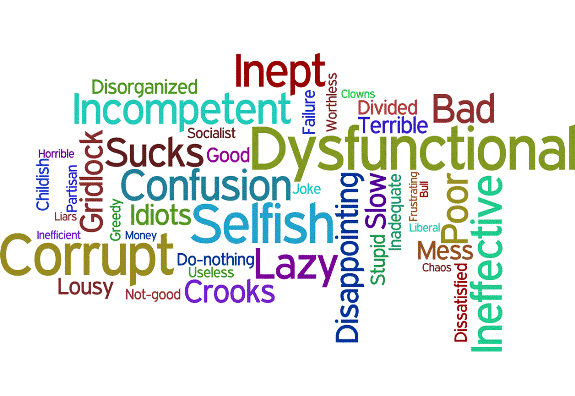Illegitimate Impeachment
Congress impeached President Trump on December 18. It was not legitimate. The resulting charges were delivered to the Senate today.
Yes, Congress has the right to impeach, but it consistently lacks the popular confidence and moral authority to act so drastically. Congress has neither acted effectively to restrain the president from purported misbehavior, passed a formal rebuke, or officially censured him—all steps that would precede impeachment if the process were approached with appropriate gravity. Instead, impeachment is used as a form of political theater.
The legislative body that has just diverted so much time and treasure to the investigation and impeachment of the president consistently delivers an approval rating well below 30%. According to Gallup, public approval for Congress last topped 30% in 2009. It last reached the 50% threshold in 2003, as patriotic fervor following 9/11 waned.
Why do Americans hold such a dim view of our representatives? We generally perceive the House of Representatives as corrupt, sluggish, prone to partisan extremism, inept, and unresponsive to the public will, despite its theoretically being the most democratic element of the federal government. Back in March, 2009, Pew Research published a survey asking respondents what word they most associated with Congress. That month, Gallup placed Congress’ approval at a measly 16%. Not surprisingly, most of the responses were negative, with “dysfunctional” and “corrupt” being the two most common. While Congress’ approval in December, 2019 was a whopping 27%, I suspect the responses would mostly be similar.

That long term negative reputation isn’t entirely undeserved. Congress passed the Affordable Care Act (ACA) over popular disapproval. It failed to repeal, reform, or replace ACA, despite years of promises and a strong electoral mandate. It has failed to pass a federal budget for five whole years or even to take any significant expenses off of autopilot, despite repeated electoral mandates for fiscal reform. It hasn’t addressed education reform in any meaningful way in years. It bailed out the banks and auto industry, but has shelved the issue of bad student loans. It has failed to police its own membership or bring corrupt members of the executive branch to real account for anything meaningful. It shoves its responsibilities off to regulatory bodies in the executive branch with enthusiasm. Pork barrel spending continues unabated, despite efforts against earmarks, and one can generally guess a representative’s vote on any given issue by looking at his list of campaign donors. Meanwhile, issues that enjoy unreserved popular support among voters across the political spectrum generally languish, unaddressed.
Rather than doing its job of passing, reforming, and repealing laws, Congress passes its time with do-nothing, non-binding resolutions and making accusations across the aisle (in both directions) like “mean girls” in high school.
While many of its membership have been accused of unethical, or even illegal, behavior, Congress is shockingly reluctant to police its own. In the history of the institution, 11040 Americans have served in the House of Representatives. Of those, only 23 have ever been censured, five if those being since 1966. Only five representatives have ever been expelled, and three of those were removed for supporting the Confederacy during the Civil War. Those 28 individuals represent about 0.25% of the total membership of the body throughout its history. In comparison, the four presidents who have been subject to an impeachment investigation represent approximately 8.89% of US presidents. In other words Congress is over 35 times more likely to conduct an impeachment investigation than censure or expel a congressman.

While the party opposite the sitting president (whoever it is) whines incessantly about the executive branch allocating funds inappropriately, Congress almost never musters the intestinal fortitude to deny a president’s requests for funds. It has literally proven easier for the House to impeach the president than to govern the purse strings in a consistent manner, even though both are Constitutional functions of Congress.
It has also proven easier to impeach the president than to censure him, even though censure is far less complex, requires a smaller majority to pass, and can be done by either the House or Senate without the concurrence of the other body. Censure also creates a “paper trail” of Congress’ disapproval of the president’s behavior and creates a mechanism for demanding correction of that behavior. In a just system, censure would always precede impeachment, but it never has.
In practice, Congress has preferred showdowns with the executive branch. Andrew Jackson is the only president to have been formally censured by Congress (by the Senate, for misconduct relating to the dissolution of the national bank), and even that was later expunged when Jackson’s party (the Democrats) later regained control of the House. Censure has been seriously discussed on three other occasions that led to the passage of bills reprimanding the president less directly (Buchanan, Lincoln, and Taft, all having to do with various kinds of corruption). No president who has been subject to an impeachment investigation has ever been censured by either house of Congress. Censure bills were introduced against Nixon and Clinton, but failed to pass. Furthermore, the most legally questionable and shocking presidential actions have never met with either censure or impeachment. Really, that’s all the evidence I need to be convinced that the purpose of impeachment has always been political theater.
As a mom, the behavior of the current session of Congress reminds me strongly of children trying to avoid doing chores. You tell a child to do a chore they dislike, and then you have to stay on top of them about it. If you don’t, the child will argue, do other things, try to start conversations on other topics, complain about siblings who “have it easier”, or anything else to get out of or delay doing the task at hand. Congress does and is doing the same thing. It would rather do just about anything but the actual work of governing the country, and this impeachment investigation is yet another excuse for not passing a budget, legal reforms, or whatever else it actually needs to do. Unlike parents, voters only have the ability to rebuke wayward congressmen at the ballot box, and only in the most general terms, making it nearly impossible to enforce on them the task of popular representation.
Congress refuses to act like a legislative body, let alone as a check on executive power. The electorate knows it. A body that shirks its most basic functions and refuses to enforce an ethical standard of behavior on its own membership can hardly expect voters to respect the use of its most exceptional and unwieldy authority. No investigation can ever be just if the investigating body is corrupt. A meaningful evaluation of the president’s conduct is impossible until Congress gains public confidence and respect.
Rachel is a Midwestern, conservative, ex-liberal mom with a lot to say. She shares her thoughts on mothering at her blog Trial & Error Home Ec and shares underreported world news at In Other News on FaceBook.







